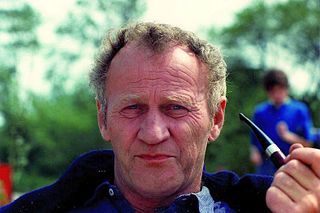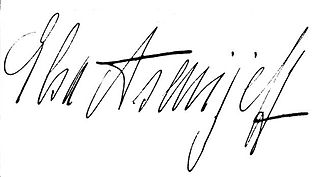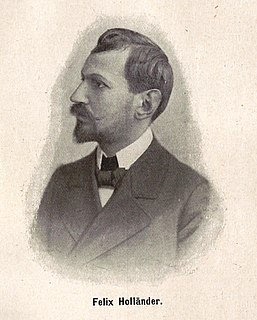Related Research Articles

Dietrich Fischer-Dieskau was a German lyric baritone and conductor of classical music, one of the most famous Lieder performers of the post-war period, best known as a singer of Franz Schubert's Lieder, particularly "Winterreise" of which his recordings with accompanists Gerald Moore and Jörg Demus are still critically acclaimed half a century after their release.

Joseph Freiherr von Eichendorff was a German poet, novelist, playwright, literary critic, translator, and anthologist. Eichendorff was one of the major writers and critics of Romanticism. Ever since their publication and up to the present day, some of his works have been very popular in Germany.

Friedrich Gerstäcker was a German traveler and novelist.

Ricarda Huch was a pioneering German intellectual. Trained as an historian, and the author of many works of European history, she also wrote novels, poems, and a play. Asteroid 879 Ricarda is named in her honour. She was nominated for the Nobel Prize in Literature seven times.

Ernst August Friedrich Klingemann was a German writer. He is generally agreed to be the author of the 1804 novel Nachtwachen (Nightwatches) under the pseudonym Bonaventura.
Felix Wolfes was an American educator, conductor and composer.

Max von der Grün was a German novelist.
Hermann Reutter was a German composer and pianist who worked as an academic teacher, university administrator, recitalist, and accompanist. He composed several operas, orchestral works, and chamber music, and especially many lieder, setting poems by authors writing in German, Russian, Spanish, Icelandic, English, and ancient Egyptian and Greek, among others.
The Deruga Case is a 1938 German crime film directed by Fritz Peter Buch and starring Willy Birgel, Geraldine Katt and Dagny Servaes. It is based on the 1917 novel of the same title by Ricarda Huch.
The Wilhelm Raabe Literature Prize is a German literary award established in 2000 by the city of Braunschweig and the radio broadcaster Deutschlandradio. It is named after the 18th-century writer Wilhelm Raabe and is awarded for an individual work. The prize sum is 30,000 euro, making it one of the most significant German literary awards after the Georg Büchner Prize and the Joseph-Breitbach-Preis.

Friedrich Huch was a German writer.

Friedrich Wilhelm Graf von Bismarck was a German lieutenant general, diplomat and military writer. He wrote several major military-political works and military histories, which were very pro-Napoleon.

Elsa Asenijeff, was an Austrian writer and partner of Max Klinger.

Christiane Haßloch was a German stage actress and opera singer.

Felix Hollaender was a German writer, critic, dramaturge and theatre director. At one point he worked as a stage producer with his friend Max Reinhardt.

Marie Huch was a German writer.
Karl Friedrich Wilhelm Wander was a German pedagogue and Germanist. He published the largest existing collection of German-language proverbs.
Hans Schmidt was a German musicologist.

Rudolf Huch was a Brazilian- born German jurist, essayist and author, primarily of satirical novels and short stories. He also produced a number of educational novels. A theme to which he returned repeatedly in his writing was upward social mobility from the ranks of the provincial petty bourgeoisie. He is sometimes identified in sources by his pseudonym as "A. Schuster".

Klamer Eberhard Karl Schmidt was a jurist and a popular German poet-lyricist.
References
- 1 2 3 Eckhard Schulz (197). "Huch, Felix: Schriftsteller, * 6.9.1880 Braunschweig, † 6.7.1952 Tutzing (Oberbayern)". Neue Deutsche Biographie . Historische Kommission bei der Bayerischen Akademie der Wissenschaften (HiKo), München. p. 703. Retrieved 3 May 2021.
- ↑ Felix Huch (1880-1952) (1927). Der junge Beethoven. Ebenhausen bei München : W. Langewiesche-Brandt.
- ↑ "Huch, Felix". Autor von 31 Publikationen .... Arzt und Schriftsteller, der vor allem mit seinen biographischen Musikerromanen bekannt wurde. Bruder von Friedrich Huch. Deutsche Nationalbibliothek (Katalog der Deutschen Nationalbibliothek), Leipzig & Frankfurt am Main. Retrieved 3 May 2021.
- ↑ Marie Huch und Friedrich Huch: Im Treibsand der Geschichte. p. 116.
- ↑ Ricarda Huch: Du, mein Dämon, meine Schlange … Briefe an Richard Huch 1887–1897. vol. 1, Wallstein Verlag, Göttingen 1998, p. 704.
- ↑ Maybritt Hugo (compiler) (2 July 2020). "Lebensstationen in Braunschweig – Auf den Spuren von Ricarda Huch" (PDF). Ricarda Huch – Veranstaltungsreihe 2010. Stadt Braunschweig (Fachbereiche & Institutionen: Frauenorte Niedersachsen). Retrieved 4 May 2021.
- ↑ Felix Huch. "Ueber Magenkrebs im jugendlichen Alter". Verlag Helmut Göhring, Frankenthal & Wellcome collection, London. Retrieved 4 May 2021.
- 1 2 3 Kurt Hoffmeister (13 April 2017). Felix Huch, ein weniger bekannter Huch. Braunschweigs Literaten: 150 Autorenportraits. Books on Demand. p. 186. ISBN 978-3-7431-3045-6 . Retrieved 4 May 2021.
- ↑ Kurt Hoffmeister (13 April 2017). Marie Huch, Tochter Gerstäckers und Mutter von Dichtern. Braunschweigs Literaten: 150 Autorenportraits. Books on Demand. pp. 183–184. ISBN 978-3-7431-3045-6.
- ↑ "Brief von Felix Huch an Leopold Ziegler". Badische Landesbibliothek ; Nachlass Leopold Ziegler .... Handschriften von Huch, Felix (1880-1952) in Kalliope. Staatsbibliothek zu Berlin - Preußischer Kulturbesitz (Der Kalliope-Verbund). Retrieved 4 May 2021.
- ↑ Library of Congress. Copyright Office (1928). Huch, Felix. Der junge Beethoven. Catalog of Copyright Entries. New Series: 1927. Copyright Office, Library of Congress. p. 943.
- ↑ Beethovens Vollendung. Roman. Wilhelm Langewiesche-Brandt, Ebenhausen bei München. 1931.
- 1 2 Felix Huch (1941). Mozart - der Roman seines Werdens, v. Felix Huch. Verlag Wilhelm Langewiesche-Brandt, Ebenhausen bei München. ISBN 9783404610846.
- ↑ Felix Huch (1948). Mozart in Wien. Verlag Wilhelm Langewiesche-Brandt, Ebenhausen bei München.
- ↑ Felix Huch (1948). Dresdner Capriccio. Die Geschichte einer jungen Liebe. Karl Glöckner Verlag, Bonn.
- ↑ Felix Huch (1949). Der Kaiser von Mexiko. Bruckmann Verlag, München.